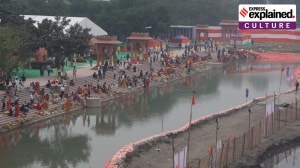Out of Cup,but Forlan is very much a winner
The Dutch are back where their history and their two modern-day goal poachers,Wesley Sneijder and Arjen Robben,deserve to be.
The Dutch are back where their history and their two modern-day goal poachers,Wesley Sneijder and Arjen Robben,deserve to be. But in every semifinal there is deep and piquant regret for a man who did not deserve to lose. That man on Tuesday was Diego Forlán. A leader,a striker,a man who very nearly lifted his team to the pinnacle of this World Cup,Forlán would have merited a place on any of the three teams who can still win it the Netherlands,Germany or Spain.
But in defeat,what courage Forlán and his depleted Uruguayan team displayed in Cape Town. Without Diego Lugano,the teams injured captain and defensive organiser,the team was open at the back. Without Luis Suárez,the suspended running mate of Forlán in attack,it lacked a second striker of cunning and movement. Yet still,in a 3-2 loss,Forlán looked technically and temperamentally among the best players on the field. He wore the captains armband for a reason.
Forlán had seen his opposite number,Giovanni van Bronckhorst,score from almost 30 yards with a searing left-footed shot that caught Uruguay goalkeeper Fernando Muslera flat-footed. But Forlán summoned his own remarkable technique to equalise.
The distance was not quite as far,but Forláns goal was better. He used a body swerve to shake off a marker and create space for himself. Then,with the merest of back lift from his left foot,he propelled the ball at startling velocity.
The Dutch goalkeeper,Maarten Stekelenburg,like Muslera,was taken by surprise. Stekelenburg is about 6 feet 5 inches tall,but Forláns curling shot passed over his head. So it was 1-1,with a howitzer from one captain and a curveball from the other.
Extraordinary career and life
Not for the first time in this tournament,Uruguay took heart from their leader. Not for the first time in his life,the 31-year-old Forlán showed what a player and what a man he is. His career and his life have been extraordinary. He follows in the footprints of his father,Pablo,who played for Uruguay in the 1974 World Cup. His maternal grandfather,Juan Carlos Corazo,played for the Argentine team Independiente in the 1930s and coached Uruguay in the early 1960s.
But it isnt merely as a player in the family trade that Forlán impresses. He was 13,and undecided about pursuing soccer or tennis as a career,when his older sister,Alejandra,was paralysed in a car crash. The young Diego told her in the hospital that he would become a soccer player and earn enough to ensure that she had a good quality of life.
True to his word,he began in Argentina at 17,moved to Manchester United,then on to Spain where,at Villarreal and now Atlético Madrid,he has been among the most productive goal scorers in Europe.
The Manchester period,from 2002 to 2004,was both the most difficult and the most revealing of his career. Everywhere else he has gone,he has scored at least a goal every two games,but at United he managed just 17 in 98 matches.
In the end he realised a move might help. It did,and how. Four goals in five World Cup games,all of them with quality,took Forlán further here than Wayne Rooney and Cristiano Ronaldo,who between them scored a ton of goals for United.
Forlán is out of the final now. But if ever you wonder what motivates him,it isnt just about trying to conjure goals. He works for his sisters foundation aimed at preventing road accidents in Uruguay,and he represents Unicef. A loser? On Tuesday,maybe,but not in this tournament,and surely not in life.



- 01
- 02
- 03
- 04
- 05




























